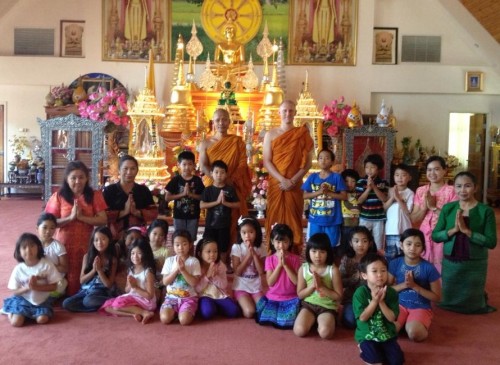How to Become a Thai Monk: 227 Rules, part 2 Posted by palmisano on Sep 30, 2013 in Culture
[This article is a continuation of a series of articles on becoming a Thai Buddhist monk.]
image: These children came for Buddhism and meditation class. It was interesting to see how it was really no different from Christian Sunday School for kids, where the kids couldn’t sit still and really didn’t want to be there!
In my previous posts I talked about the rules to follow before becoming a monk. After becoming a monk there are 227 more rules one must follow, called วินัย weMnaiM, which is something like a highly expanded version of the 10 Commandments. As a monk you aren’t required to memorize them, just generally know and follow them. For example, there are approximately 10,000 US laws written on 20,000 sheets of paper, but you don’t need to memorize them to be a law-abiding citizen!
Regardless, after ordination I decided to be a good studious monk and read all the rules. In [somewhat broken] English, of course:
http://en.dhammadana.org/sangha/vinaya/227.htm
And here you can find them written in Thai:
http://www.oknation.net/blog/print.php?id=561229
The rules are broken up into various sections, and ordered by importance. For example, the rules written first are much more important and serious than the rules written last. Some sections list cultural rules, some list rules for daily life, etc. Some rules should never be broken (like murder), while breaking other rules are considered only minor infractions (like speeding 10mph too fast on a highway). Other rules are considered outdated and most monks break them on a daily basis – I’ll go over that in a later post.
Most importantly, these are four cardinal rules. If you break any, you will be disrobed and banned for life:
1) No sex or any other intentional emission of sperm.
2) Do not steal.
3) Do not kill.
4) Do not lie about achieving a stage of enlightenment if you have not.
Note: it is against the rules to lie about anything at all, but #4 is considered the worst of any lies.
Where did the rules come from?
Buddha didn’t write these rules. They were actually decided on democratically by a committee of all of the leading monks of the time, after Buddha’s death.
What if you break a rule?
The rules itself explains what happens (see the very last section). There could even be a trial, and the rules specify various types of allowed trials. I’ve been told that these trials are extremely rare, as the problem is usually resolved beforehand.
What if?
After skimming over the rules, you are probably thinking about clever ‘what if…’ situations. For example, what if you cause someone to die although it was entirely unintentional? What if you took food that you thought was donated, but actually wasn’t, and is hence stolen?
For every situation, the rule is only broken if it was intentional. As said in Thai, มันอยู่ที่ใจ, meaning ‘it’s where the heart is’.

Build vocabulary, practice pronunciation, and more with Transparent Language Online. Available anytime, anywhere, on any device.




